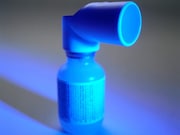Omega fatty acid intake also modifies effect of indoor PM exposure on respiratory symptoms
FRIDAY, March 29, 2019 (HealthDay News) — Intake of omega-3 and omega-6 is associated with pediatric asthma morbidity and may modify the response to indoor particulate matter (PM), according to a study published online March 29 in the American Journal of Respiratory and Critical Care Medicine.
Emily P. Brigham, M.D., from the Johns Hopkins University School of Medicine in Baltimore, and colleagues examined the correlation between omega-3 and omega-6 fatty acid intake and pediatric asthma morbidity in 135 children with asthma. They also examined the association between fatty acid intake and the strength of indoor PM-related asthma symptoms, albuterol use, and systemic inflammation.
The researchers observed a correlation between higher omega-6 intake and increased odds of worsened asthma severity and a lower forced expiratory volume in one second/forced vital capacity ratio. The effect of indoor PM2.5 on symptoms was reduced in association with higher omega-3 intake; the effect of indoor PM2.5 on symptoms and circulating neutrophil percentage was amplified in association with higher omega-6 intake.
“These results highlight that this highly vulnerable and at-risk population has potentially two modifiable exposures (unfavorable fatty acid intake profiles and high indoor PM exposures) combining to effectively worsen asthma morbidity,” the authors write. “It is possible that the collective improvement of both dietary and indoor air exposures may have the greatest impact on improving asthma health.”
Copyright © 2019 HealthDay. All rights reserved.








